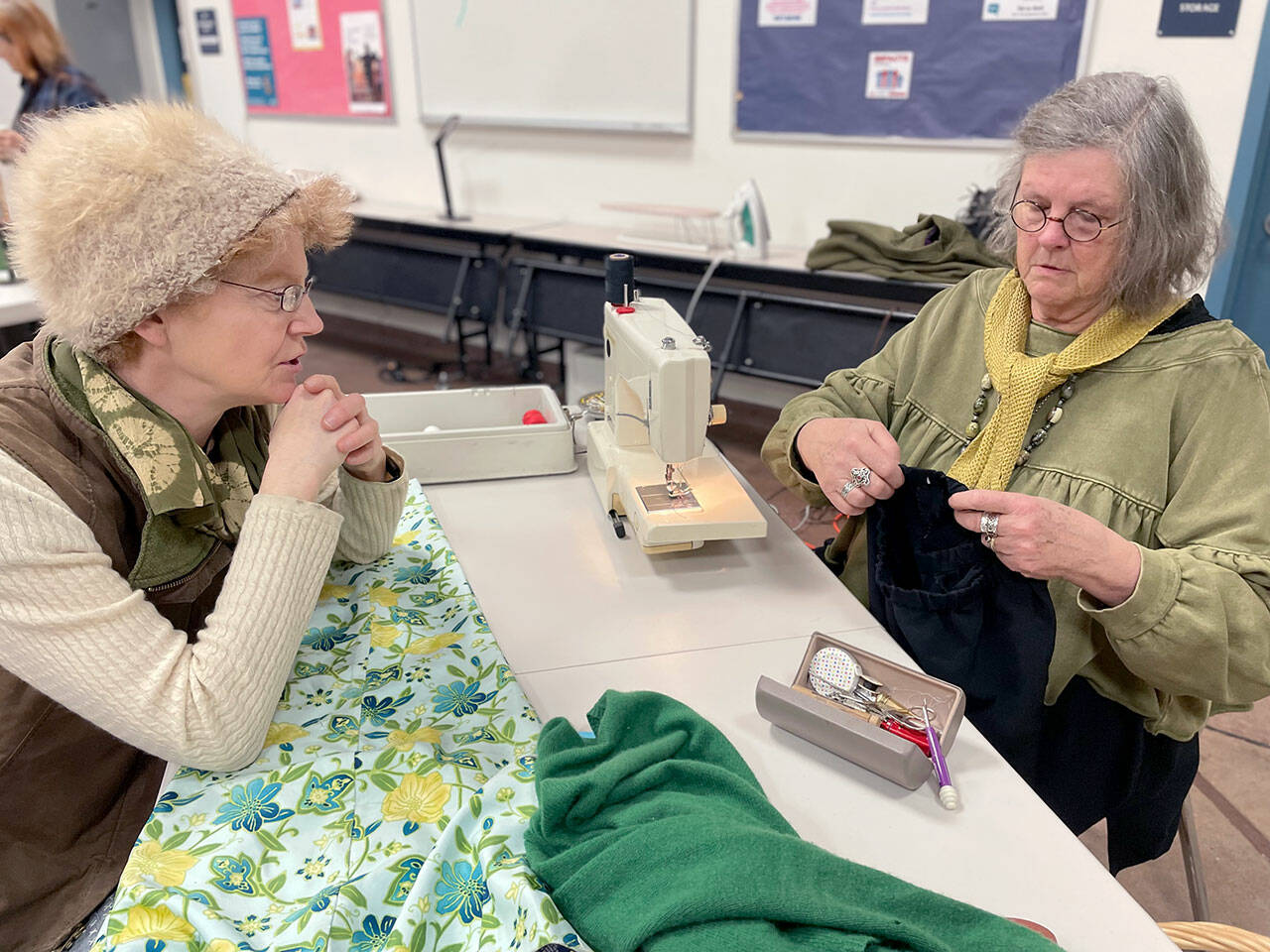PORT TOWNSEND — Dull knives, torn pants, broken doorknobs and necklace clasps, busted clock radios and bikes that jump gears.
Old household items needn’t be destined for the garbage can when all it takes is some skill to return them to normal use — and keep them out of landfills.
The Port Townsend Marine Science Center’s JeffCo Repair event Saturday at Blue Heron Middle School brought together volunteers who supplied the know-how and members of the public who supplied the damaged goods — from vacuum cleaners that had died to zippers that wouldn’t zip — for the first of four free events to encourage reuse and recycling, foster the exchange of practical knowledge and encourage community building.
The next JeffCo Repair event will be from 10 a.m. to 1 p.m. Saturday at the Quilcene Community Center, 294952 U.S. Highway 101, Quilcene.
The next two will be from 10 a.m. to 1 p.m. May 13 at the Tri-Area Community Center, 10 W. Valley Road in Chimacum, and from 11 a.m. to 2 p.m. June 3 at the Brinnon Community Center, 306144 U.S. Highway 101 in Brinnon.
Events like JeffCo Repair — also known as repair cafes and fix-it fairs — are not about dropping off a broken item and returning when it’s fixed.
You watch as the volunteer diagnoses the problem and walk through the solution and repair together.
“Repair is a dying art,” Marine Science Center outreach coordinator Mandi Johnson said. “Watching the fixer and learning how to do it yourself is empowering. It also brings repair back into your mindset.”
Loran Scruggs brought a kelly green long-sleeve cashmere sweater with moth holes, a pair of brightly colored silk pants with a hole in the leg and a pair of black pants with a split seat to Paula Lalish and her white Kenmore sewing machine.
More than just a seamstress, Lalish creates wearable art, but she got to work putting a new the seam in the black pants.
Scruggs said the clothes were too nice to throw away and the fixes were small, but they needed an expert hand like Lalish’s to mend them.
“I heard they were doing this, and I wanted to come out and support them,” Scruggs said.
JeffCo Repair was funded with a two-year $115,579.78 Public Participation Grant from the state Department of Ecology and with support from Local 20/20.
Over the course of five JeffCo Repair events last year, volunteers repaired 136 household items and helped prevent items that still had life in them from being turned into 838 pounds of solid waste.
David Bise brought a hoe and a spade to the event, where two volunteers were ready to sharpen by garden tools, hand knives, blades and shears.
“I think this is a great idea,” Bise said. “People often don’t have the tools to do it themselves. It’s a throwaway society, especially things that are still useful.”
Encouraging communities to come together to contribute to solutions that reduce solid waste by hosting events like repair cafes and tool libraries, where people can borrow what they need and return it when they’re done, is critical to the Department of Ecology’s goal of reducing solid and toxic waste, said Faith Wimberley, the Public Participation Grant manager.
Washington state is a leader when it comes to repair events, she said.
“We recognize that no amount of recycling, no amount of incineration is going to solve our waste problems,” Wimberley said. “We need to reduce our consumption, reuse what already exists. We need to harness that internal community capacity to repair and reuse and keep these things out of the waste stream.”
About 84 percent of the items people have brought to JeffCo Repair have been fixed. Others, like a broken pink retractable dog leash a woman hoped could be repaired, could not be fixed.
Volunteer Dave Ehnebusake said that, included among the items he has fixed at JeffCo Repair are DVD players, VCRs, micro-cassette recorders, Roombas, a jigsaw and lots and lots of lamps.
“People have grandma’s old lamp, lamps with sentimental value, lamps from the 1920s and 1930s,” Ehnebusake said. “They’re fun because they’re simple and easy to fix.”
It is recently manufactured items that can prove to be a challenge or impossible to repair, Ehnebusake said.
“Newer stuff is not made to be taken apart, it’s snapped together or glued instead of screwed,” he said. “It’s meant to be thrown away.”
Information about JeffCo Repair can be found at https://ptmsc.org/jeffco-repair.
The state Department of Ecology’s Public Participation Grants provide up to $60,000 a year for nonprofits and individuals for programs to increase public participation in and understanding of reducing solid waste.
Grant funding is on a two-year cycle; applications for 2023-2025 will begin in April. For more information, go to the Department of Ecology’s website at tinyurl.com/fdjyk895.
________
Reporter Paula Hunt can be reached at paula.hunt@soundpublishing.com.

